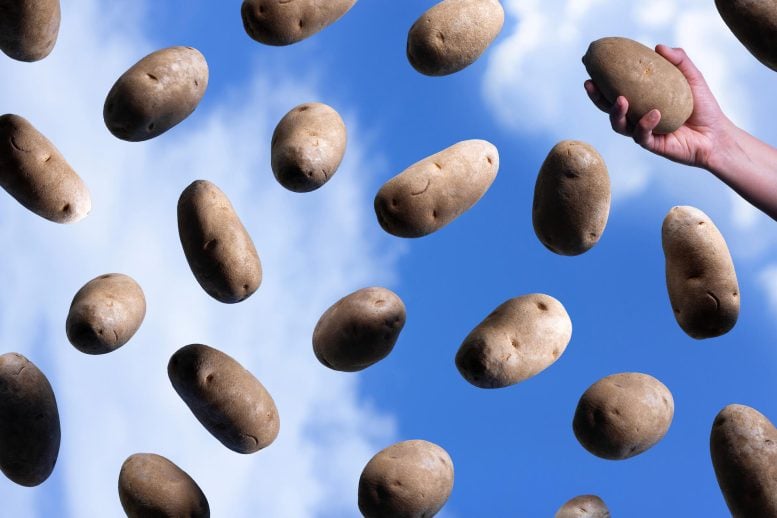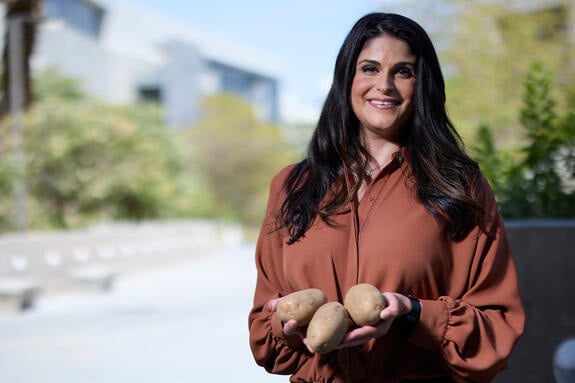
Nutrition sciences professor Neda Akhavan’s recent research identifies potatoes as a potential superfood for individuals with Type 2 diabetes.
New research reveals that properly prepared potatoes can offer significant health benefits, including cardiovascular improvements, for people with Type 2 diabetes, challenging their negative dietary reputation.
The potato is small enough to fit inside a person’s hand yet contains enough nutrients to whittle waistlines and lower blood sugar in adults with Type 2 diabetes. Yet, despite the fact that potatoes – particularly the skins – are packed with health-boosting nutrients, they routinely get a bad rap among dieters.
That may soon change, thanks to new research by Neda Akhavan, assistant professor in the Department of Kinesiology and Nutrition Sciences within UNLV’s School of Integrated Health Sciences. Akhavan recently presented her findings on the cardiovascular benefits of potatoes for those living with Type 2 diabetes to the Alliance for Potato Research and Education.
“I like doing research on food items that are highly stigmatized in the nutrition world,” she said. “Most people associate the potato as something that is mostly fried or has a lot of fat, and we wanted to shine a light on how a potato – when prepared properly – can be both functional and healthy.”

Putting Potatoes to the Test
Akhavan enlisted 24 participants for the study, all of whom had Type 2 diabetes that was well controlled with medication. Funded by the Alliance for Potato Research and Education, this is believed to be the first study of its kind to scientifically measure the cardiovascular benefits of potatoes for adults with diabetes.
Participants in the study group were each given a pre-prepared baked potato with the skin measured to 100g, with only 20 grams of carbohydrates, roughly enough to fit in one hand to incorporate as a snack or side with meals daily. The control group was given a similar potion of white rice with the same number of calories and carbohydrates. The study ran daily for 12 weeks, which is considered the minimum time needed to see changes in indices of glycemic control and cardiometabolic health.
Study participants were permitted to add herbs or spices to the potatoes, or up to ½ tbsp of butter, but they were advised not to fry their potato.
Key Takeaways and Recommendations
A modest decrease in fasting blood glucose levels was present for study participants who ate potatoes. Study participants also showed improvements in body composition, waist circumference, and a decrease in resting heart rate.
“The results from our study provide evidence that white potatoes can be healthfully incorporated in the diet of individuals with Type 2 diabetes when substituted for other foods with a high glycemic load, such as long-grain white rice,” Akhavan said. “Additionally, there were no harmful effects on measured health outcomes, and some cardiometabolic health benefits were shown, which aligned with what we expected to see. Therefore, diabetics should not shy away from potatoes.”
Akhavan says that just like all foods, moderation – and preparation methods – are key.
“Potatoes are a very versatile food and can be eaten with most types of cuisines, but you want to make sure to incorporate them into a well-rounded diet,” she said. “For those tight on time, consider making a large batch of baked or roasted potatoes and meal prep to last you a while. I’m not against boiling potatoes, but you want to keep as much of the potassium from the skin as you can, and you lose some of that when you boil them.”
Making the Case for Potatoes
Potatoes are the richest source of dietary potassium in Western diets, and high-potassium diets have been shown to prevent high blood pressure and Type 2 diabetes development. Additionally, potato skins contain a certain type of fiber called “resistance starch,” which has been shown to improve glucose control, lipid profiles, and satiety. Because of these added health benefits, Akhavan recommends eating potatoes with the skin.
So, the next time you want to reach for a banana, she added, reach for that potato instead.
“A lot of people are shocked to learn that a potato has a higher level of potassium than a banana,” she said. “Believe it or not, a baked potato is one of the most satiating foods consumed within the western diet. And, when it is consumed baked, it increases our ability to feel fuller throughout the day.”
Akhavan intends to expand the study in the coming months to include a larger and more diverse participant population, and incorporation of potatoes within a Mediterranean dietary pattern. She also plans to explore the role of potato consumption and its effects on dietary patterns and related health benefits.
Meeting: NUTRITION 2024
The research was funded by the Alliance for Potato Research and Education.
Never miss a breakthrough: Join the SciTechDaily newsletter.
9 Comments
Funded by the Alliance for Potato Research and Education,
we’ll need more study, more independent
This article, and every nutritionist, should mention that cooking potatoes above 248 degrees F results in the formation of toxic acrylamide, a known neurotoxin and carcinogen. This is a problem for all carbohydrates heated over this temperature. This makes baked potatoes toxic. Boiled is safer. In addition, potato skins must be free of green areas, which are poisonous. And the skin can have traces of pesticides, herbicides, fungicides, and dirt. See my article, COOKED TO DEATH: How the acrylamide in food causes nerve damage and Long-COVID. https://www.academia.edu/87219890/COOKED_TO_DEATH_How_the_acrylamide_in_food_causes_nerve_damage_and_Long_COVID
Seems like potato propaganda… a little too good to be true. As a diabetic I think I’ll keep researching. I am intrigued about being able to eat at least potato skins.
Potatoes are the backbone of this country. Without potatoes we wouldn’t have running cars. Don’t let the big rice corp fool you into thinking rice is better than potatoe just because is smaller than potato.
In addition to wheat, rice, oats, barley ans spinach, potatoes absorb cadmium from the soil. Cadmium is lethal to the kindneys in minute quantities. Rice also absorbs arsenic from the soil.
Even from farms that only grow certified organic?
I like to “bake” my potatoes in a microwave. It only takes 8 minutes. Does this take away the good stuff from the potatos?
You can make them even healthier by cooking them, then freezing them for 3 days and then reheating & eating them. The cooking/freezing process converts more of the starch to resistant starch. It’s called retrogradation. The same goes for pasta and rice and bread, etc. I wish I had more room in my freezer…
Don’t believe this. She was paid by the potato alliance for promoting potato. Simple as that. Please don’t play with our health. Author of Eat to Death is right. Read Elijah Muhammad’s Eat to live available from Nation of Islam (NOI)website, or Seventh Day Adentists food research. In hospital I was given boiled potato for dinner daily. I eat potato with skin on for Dinner daily to repair muscle after workout and for weight loss diet.